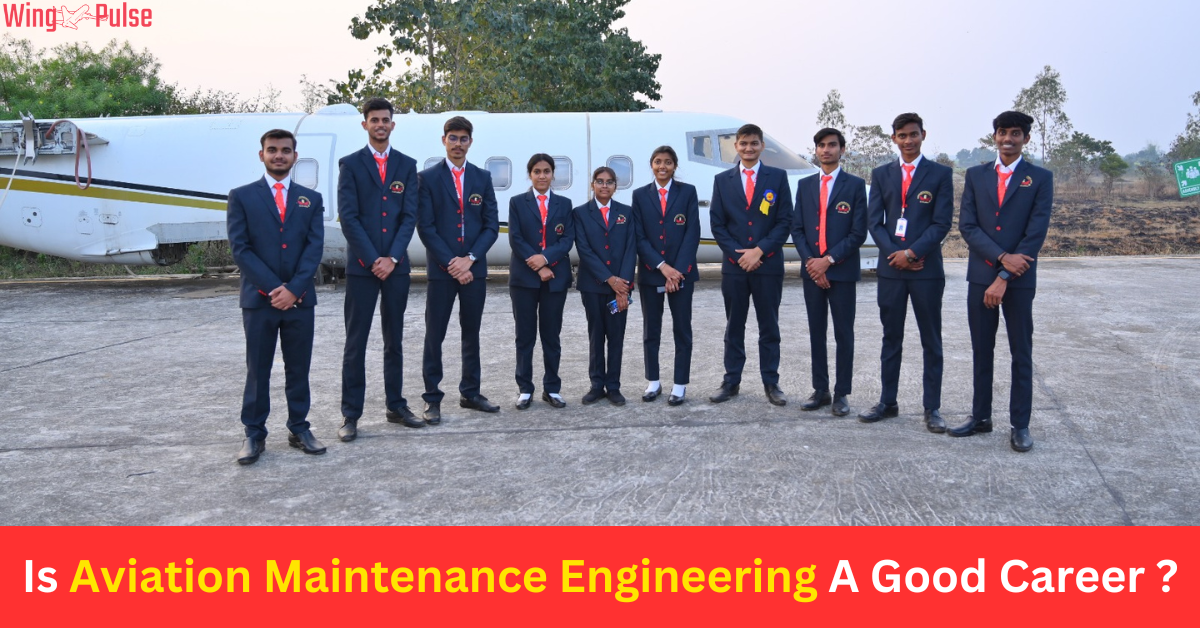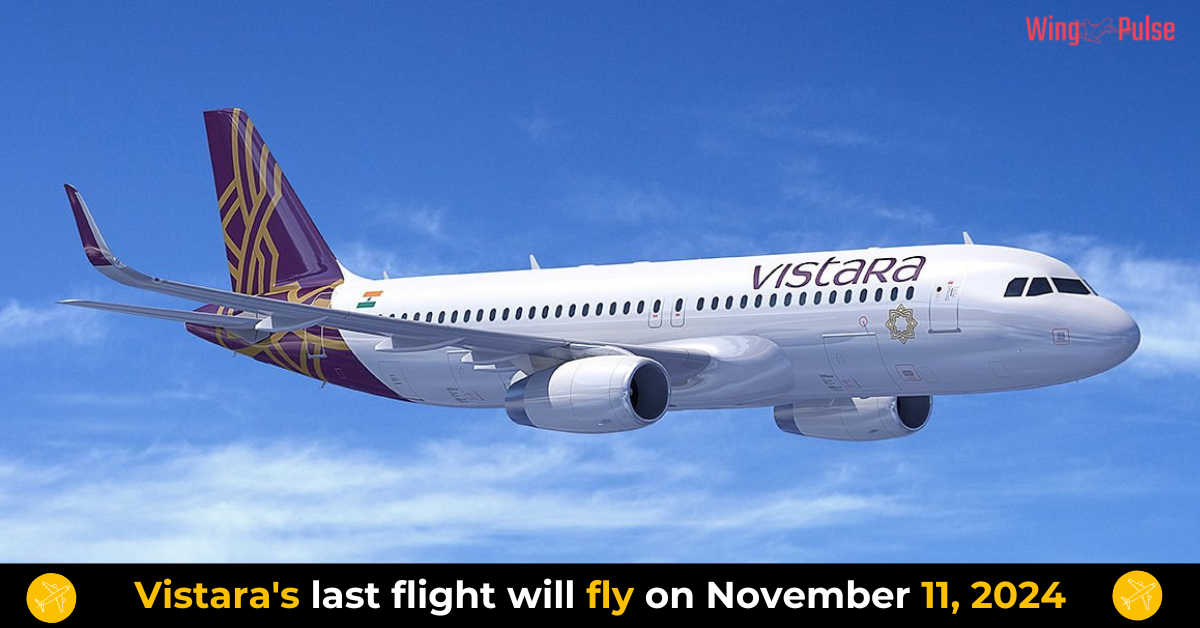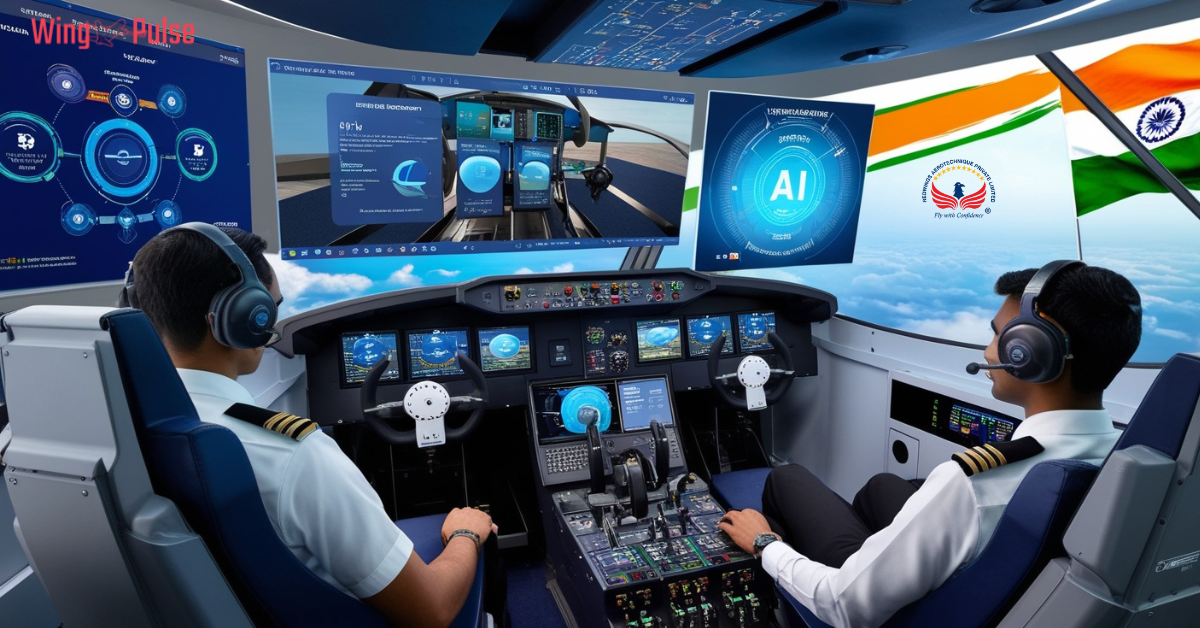Is Aviation Maintenance Engineering a Good Career ?

Is Aviation Maintenance Engineering a Good Career : Aviation maintenance engineering in India is a profession that merges technology, precision, and responsibility. This field involves the maintenance, repair, and overhaul of aircraft to ensure they meet stringent safety and performance standards. For those considering a career in this field in India, it’s essential to understand both the rewards and challenges it offers.
Table of Contents
The Growing Demand for Aviation Maintenance Engineers in India
India’s aviation industry is expanding rapidly, driven by increasing domestic and international travel, as well as advancements in aerospace technology. According to the International Air Transport Association (IATA), India is poised to become the third-largest aviation market by 2025. This growth translates into a rising demand for skilled aviation maintenance engineers to keep the growing fleet of aircraft in optimal condition.
Key Benefits of a Career in Aviation Maintenance Engineering in India
1. High Job Security and Demand
- The growth of India’s aviation sector ensures a steady demand for maintenance engineers. With new airlines entering the market and existing ones expanding their fleets, the need for regular maintenance and safety checks is paramount.
2. Competitive Salary and Benefits
- Aviation maintenance engineers in India are well-compensated, with salaries reflecting the critical nature of their work. In addition to competitive pay, many positions offer benefits such as health insurance, retirement plans, and opportunities for overtime pay.
3. Opportunities for Advancement
- The Indian aviation sector offers clear pathways for career progression. Starting as a junior technician, one can advance to senior engineer, supervisory roles, and even into management positions within maintenance operations.
4. Technological Engagement
- Aviation maintenance engineers work with cutting-edge technology, from advanced diagnostic tools to sophisticated aircraft systems. This continuous interaction with new technology can be both intellectually stimulating and professionally rewarding.
5. Global Career Opportunities
- The skills of an aviation maintenance engineer are globally recognized, providing opportunities to work in different countries and cultures. This global mobility can be particularly appealing for those with a sense of adventure.
Role and Responsibilities of an AME
Aviation Maintenance Engineers (AMEs) play a critical role in ensuring the safety and reliability of aircraft. Their responsibilities encompass a wide range of tasks, all aimed at maintaining the highest standards of aviation safety and performance. Here’s an overview of the key roles and responsibilities of an AME :
1 .Routine Inspections and Maintenance
- AMEs conduct regular inspections of aircraft to ensure they are in good working condition. This involves checking various aircraft systems, including engines, avionics, hydraulics, and structural components, to identify and rectify any issues.
2. Troubleshooting and Repairs
- When issues are identified, AMEs troubleshoot to determine the cause and perform the necessary repairs. This requires a deep understanding of aircraft systems and the ability to diagnose problems accurately.
3. Overhauls and Modifications
- AMEs are responsible for performing overhauls on aircraft components that require extensive maintenance or replacement. They also implement modifications and upgrades to aircraft systems to enhance performance or comply with new regulations.
4. Compliance with Regulations
- Ensuring that all maintenance activities comply with the regulatory standards set by the Directorate General of Civil Aviation (DGCA) and other relevant authorities is a critical responsibility. AMEs must document all work performed and maintain detailed records.
5. Safety Checks and Testing
- After maintenance and repairs, AMEs conduct thorough safety checks and testing to ensure the aircraft is airworthy. This includes performing test flights or engine runs to verify the functionality and safety of the aircraft.
6. Use of Advanced Tools and Technology
- AMEs utilize a range of advanced diagnostic tools and software to conduct maintenance and repairs. Staying updated with the latest technological advancements in aviation is essential for effective performance in this role.
7. Coordination and Communication
- Effective communication and coordination with other maintenance personnel, pilots, and ground staff are crucial. AMEs must provide clear instructions and updates regarding the maintenance status and any issues that need attention.
8. Lifelong Learning and Training
- The aviation industry is constantly evolving, with new technologies and regulations emerging regularly. AMEs must engage in continuous learning and professional development to stay current with industry standards and best practices.
Need of AME in the Aviation Industry
The aviation industry relies heavily on the expertise of Aviation Maintenance Engineers (AMEs) to ensure the safety, reliability, and efficiency of aircraft operations. Here’s why AMEs are indispensable to the industry :
1 Ensuring Safety and Compliance
- Safety Assurance : The primary responsibility of AMEs is to ensure the safety of aircraft. By conducting thorough inspections, routine maintenance, and necessary repairs, they prevent potential issues that could compromise the safety of passengers and crew.
- Regulatory Compliance : The aviation industry is governed by stringent regulations and standards set by authorities like the Directorate General of Civil Aviation (DGCA) in India. AMEs ensure that all maintenance activities comply with these regulations, which is crucial for maintaining the airworthiness of aircraft.
2. Enhancing Operational Efficiency
- Minimizing Downtime : Regular maintenance and timely repairs conducted by AMEs help minimize aircraft downtime. This ensures that airlines can maintain their schedules and operate efficiently, reducing delays and cancellations.
- Improving Aircraft Performance : By performing routine inspections and implementing necessary modifications, AMEs enhance the overall performance and longevity of aircraft. This leads to better fuel efficiency, reduced operational costs, and improved passenger satisfaction.
3. Adapting to Technological Advancements
- Keeping Up with Technology : The aviation industry is continuously evolving with new technologies and advancements. AMEs play a crucial role in integrating these technologies into existing aircraft systems and ensuring that they function optimally.
- Training and Development : AMEs undergo continuous training to stay updated with the latest advancements in aviation technology. This ongoing professional development is essential for maintaining the highest standards of aircraft maintenance.
4. Supporting Industry Growth
- Meeting Industry Demand : With the rapid growth of the aviation sector in India, there is an increasing demand for skilled AMEs. Their expertise is vital for supporting the expansion of airlines and the introduction of new aircraft.
- Global Opportunities : The skills of AMEs are globally recognized, providing opportunities for Indian engineers to work with international airlines and in different countries. This not only enhances their career prospects but also contributes to the global aviation industry.
Need Education for AME
To become an Aviation Maintenance Engineer (AME), Candidates should have completed a 10+2 (or equivalent) with Physics, Chemistry, and Mathematics (PCM) from a recognized board. pecialized Knowledge
1. Formal Education and Training
- Certification Programs : Aspiring AMEs must complete an approved aircraft maintenance engineering program from a recognized institution. These programs cover both theoretical and practical aspects of aircraft maintenance.
- Examinations and Licenses : After completing their education, candidates must pass a series of examinations to obtain their AME license. This certification process ensures that only qualified individuals are allowed to perform maintenance on aircraft.
2. Continuous Learning
- Keeping Up with Technological Advancements : The aviation industry is constantly evolving, with new technologies being introduced regularly. A strong educational background enables AMEs to adapt to these changes and continue their professional development.
- Specialized Training : Many AMEs pursue additional certifications and training in specific areas of aircraft maintenance to enhance their expertise and career prospects.
Job Market and Employment Opportunities for AME in India
1. Growing Aviation Sector
- Expansion of Airlines : With new airlines entering the market and existing ones expanding their fleets, the demand for qualified AMEs is on the rise.
- Increase in Air Travel : Rising domestic and international travel boosts the need for regular aircraft maintenance and safety checks.
2. Diverse Employment Opportunities
- Commercial Airlines : Major airlines require a large number of AMEs to maintain their fleets and ensure passenger safety.
- Maintenance, Repair, and Overhaul (MRO) Organizations : Specialized MRO companies provide dedicated services, offering numerous job opportunities for AMEs.
- Government and Defense : Opportunities also exist within government aviation sectors and the defense industry, maintaining military aircraft and ensuring their operational readiness.
3. Competitive Salaries and Benefits
- Attractive Compensation : The critical nature of the job ensures competitive salaries and benefits for AMEs in India.
- Career Progression : Clear pathways for advancement allow AMEs to move up to senior positions, supervisory roles, and management.
4. Global Career Prospects
- International Opportunities : Skills of Indian AMEs are globally recognized, opening doors to employment with international airlines and in different countries.
- Cross-Cultural Experience : Working abroad offers AMEs the chance to gain diverse experiences and enhance their professional skills.
Salary of AME in India
A career as an Aviation Maintenance Engineer (AME) in India offers competitive remuneration, reflecting the critical nature and responsibilities of the role. Here’s a breakdown of what aspiring AMEs can expect in terms of salary :
1. Entry-Level Salaries
- Starting Compensation : Fresh graduates or newly licensed AMEs can expect starting salaries ranging from INR 3 to 6 lakhs per annum. This varies depending on the employer, location, and the individual’s qualifications and certifications.
2. Mid-Level Salaries
- Experience-Based Increment : With 3 to 5 years of experience, AMEs can earn between INR 10 to 15 lakhs per annum. Experience in specific aircraft models or systems can also influence salary levels.
3. Senior-Level Salaries
- Advanced Roles and Responsibilities : Senior AMEs, with over 10 years of experience and additional certifications, can earn upwards of INR 25 lakhs per annum. Positions such as lead engineers or maintenance supervisors fall into this category.
The Challenges in Aviation Maintenance Engineering in India
- Strict Regulatory Environment : Aviation is one of the most regulated industries. Engineers must adhere to rigorous guidelines and protocols set by the Directorate General of Civil Aviation (DGCA), ensuring every task meets stringent safety standards. This requires a meticulous approach and a strong commitment to quality.
- High Responsibility : The safety of passengers and crew depends on maintenance engineers. This responsibility can be daunting, as even minor errors can have significant consequences. It requires a high level of attention to detail and an unwavering commitment to safety.
- Demanding Work Environment : The job often involves working in various conditions, including outdoors and in hangars, sometimes during irregular hours or in shifts. The physical demands and need for precision can be challenging but are essential to ensure aircraft safety.
- Continuous Learning : With rapid advancements in aviation technology, maintenance engineers must commit to lifelong learning. Regular training and certification updates are necessary to stay abreast of the latest developments and maintain expertise.
Conclusion : Is Aviation Maintenance Engineering a Good Career
Aviation maintenance engineering can be an excellent career choice for those with a passion for aviation, technology, and safety. The field offers strong job security, competitive salaries, and numerous opportunities for advancement. However, it also demands a high level of responsibility, adherence to strict regulations, and a commitment to continuous learning. For individuals who thrive in a dynamic, detail-oriented environment and are driven by the challenge of ensuring safety in the skies, aviation maintenance engineering can be a highly rewarding career.
What is an Aviation Maintenance Engineer (AME)?
An Aviation Maintenance Engineer (AME) is a certified professional responsible for the maintenance, repair, and overhaul of aircraft. They ensure that aircraft meet all safety and performance standards set by regulatory authorities.
What qualifications are required to become an AME in India?
To become an AME in India, you need to complete a DGCA-approved aircraft maintenance engineering program. Additionally, you must pass the required DGCA exams to obtain your AME license.
What are the job prospects for AMEs in India?
The job prospects for AMEs in India are strong, given the rapid growth of the aviation sector. Opportunities are available with commercial airlines, MRO organizations, government and defense sectors, and private firms.
What is the starting salary for an AME in India?
The starting salary for an AME in India typically ranges from INR 3 to 6 lakhs per annum, depending on the employer, location, and the individual’s qualifications.
How can an AME advance their career?
An AME can advance their career by gaining experience, obtaining additional certifications, and specializing in specific aircraft models or systems. Career progression can lead to senior engineer positions, supervisory roles, and management.
Are there global opportunities for AMEs trained in India?
Yes, the skills of AMEs trained in India are globally recognized, providing opportunities to work with international airlines and in different countries. This can enhance their professional experience and career prospects.
What are the key responsibilities of an AME?
Key responsibilities of an AME include conducting routine inspections, troubleshooting and repairing aircraft systems, performing overhauls, ensuring compliance with regulatory standards, conducting safety checks, and using advanced diagnostic tools.
What kind of work environment do AMEs work in?
AMEs often work in demanding environments, including hangars and outdoor settings, sometimes during irregular hours or shifts. The job requires precision, attention to detail, and a commitment to safety.
How important is continuous learning for an AME?
Continuous learning is crucial for AMEs due to rapid advancements in aviation technology. Regular training and certification updates are necessary to stay current with industry developments and maintain expertise.
What benefits do AMEs typically receive besides their salary?
Besides competitive salaries, AMEs often receive benefits such as health insurance, retirement plans, performance bonuses, overtime pay, travel allowances, and housing benefits, depending on the employer.
How does one choose a good AME training institute in India?
When choosing an AME training institute in India, ensure it is approved by the Directorate General of Civil Aviation (DGCA). Research the institute’s reputation, facilities, faculty, and placement records to make an informed decision.
What impact does the aviation industry’s growth have on the demand for AMEs?
The growth of the aviation industry increases the demand for AMEs. As airlines expand their fleets and air travel becomes more prevalent, the need for skilled maintenance engineers to ensure the safety and reliability of aircraft rises accordingly.



Valuable information for students ✈️✈️
good information